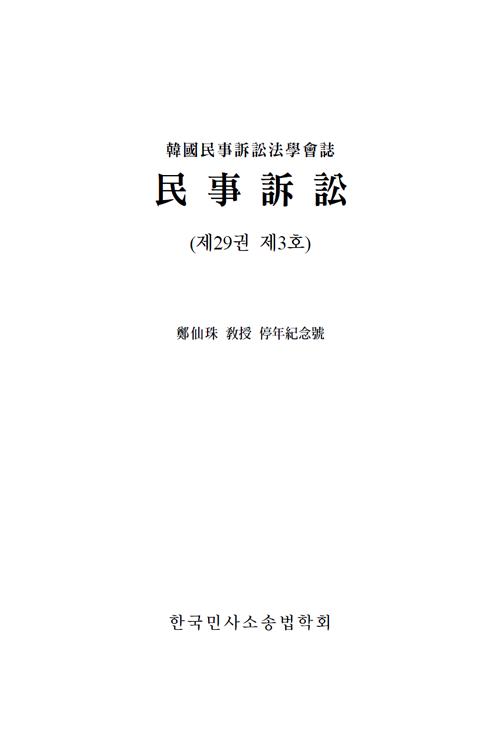- 영문명
- Recent Developments in English, Hong Kong, Singapore Arbitration Law Regarding the Applicable Law of an Arbitration Agreement and Implications for Korean Law
- 발행기관
- 한국민사소송법학회
- 저자명
- 김민경
- 간행물 정보
- 『민사소송』제29권 제3호, 559~608쪽, 전체 50쪽
- 주제분류
- 법학 > 법학
- 파일형태
- 발행일자
- 2025.10.30

국문 초록
Arbitration is a preferred method of dispute resolution in international transactions. Since arbitration is grounded in the principle of party autonomy, arbitration agreements forms the fundamental basis of arbitration. In practice, however, issues concerning the formation and validity of arbitration agreements frequently arise. In court proceedings, questions regarding the existence, formation, or validity of an arbitration agreement may arise in three principal contexts: (a) the Court’s review of the arbitral tribunal’s decision on its jurisdiction (Article 17 Korean Arbitration Act); (b) Court proceedings in breach of an arbitration agreement (Article 9 Korean Arbitration Act; United Nations Convention on the Recognition and Enforcement of Foreign Arbitral Awards (“New York Convention”), Article II(3)); (c) post-award proceedings: actions to set aside an arbitral award (Article 36 Korean Arbitration Act) and applications for recognition and enforcement of an arbitral award (Articles 37–39 Korean Arbitration Act; New York Convention, Article V). At each of these stages, determining whether there is a valid arbitration agreement necessarily involves identifying its governing law. Given that national laws may differ significantly in their approaches to the validity of arbitration agreements, an erroneous determination of the applicable law may result in incorrect outcomes. Therefore, in practice, the determination of the governing law is of critical importance. Under the New York Convention and general common law principles, the governing law of the arbitration agreement will be: (a) the law expressly or impliedly chosen by the parties; or (b) in the absence of such a choice, the law of the seat of arbitration (as per the New York Convention); or the law most closely connected to the arbitration agreement (common law principles). A recurring practical difficulty arises where the parties have specified the governing law of the main contract containing the arbitration clause but have not specified the governing law of the arbitration agreement itself, and where the law of the main contract differs from the law of the arbitral seat. In such cases, the key issue is how to determine whether the parties have implicitly designated the applicable law for the arbitration agreement. This article examines recent judicial developments in the United Kingdom, Hong Kong, and Singapore addressing the principles for determining the governing law of arbitration agreements in such circumstances. It further provides a brief review and summary of relevant Korean case law and concludes with an analysis of the implications for Korean law.
영문 초록
목차
Ⅰ. 서론
Ⅱ. 중재합의의 준거법에 관한 영국, 홍콩, 싱가포르 중재법의 동향
Ⅲ. 중재합의의 준거법에 관한 한국 판결례 및 평가
Ⅳ. 결론: 한국법에 대한 시사점
참고문헌
키워드
해당간행물 수록 논문
참고문헌
최근 이용한 논문
교보eBook 첫 방문을 환영 합니다!

신규가입 혜택 지급이 완료 되었습니다.
바로 사용 가능한 교보e캐시 1,000원 (유효기간 7일)
지금 바로 교보eBook의 다양한 콘텐츠를 이용해 보세요!


